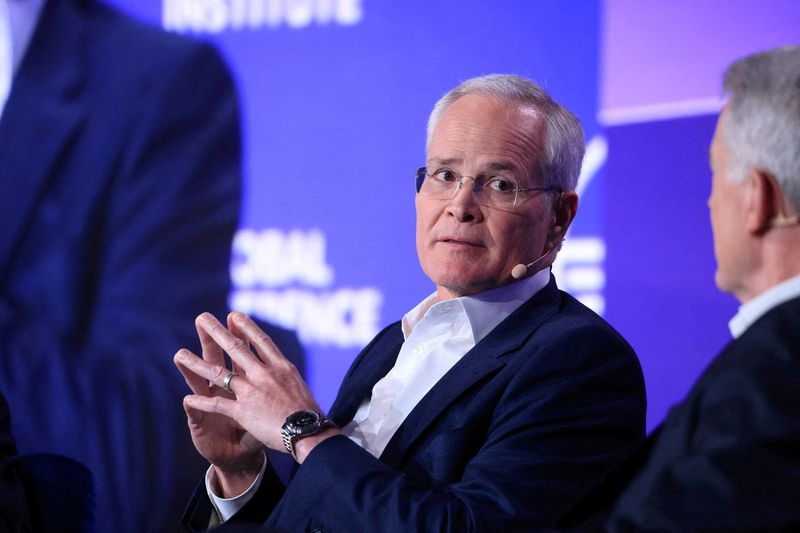By Ross Kerber and Svea Herbst-Bayliss
NEW YORK (Reuters) – Exxon CEO Darren Woods had words of warning on Tuesday for activist shareholders who thought they were following the lead of those who filed a climate-related shareholder proposal at the largest U.S. oil company.
Exxon (NYSE:) took the investors to court early this year, and Woods indicated the company was prepared to repeat the exercise against others he said could “abuse” the proxy proposal process.
“We hope that we will not have to use that action in the future. But if we find that people continue to abuse the process, we will hold them to the rules,” Woods said.
Woods spoke via video link to a meeting of the Council of Institutional Investors in New York, which represents pension funds and other institutional investors.
Exxon had sued activists Follow This and Arjuna Capital in January after they introduced a climate-related resolution before the company’s annual meeting in May. A judge ultimately dismissed the case in June, but only after the defendants withdrew their resolution and pledged not to file a similar resolution again or help others do so.
The lawsuit raised concerns that it would reduce shareholder influence. Woods said there is still a wide door for investors to make suggestions to companies.
But the proxy system, while well-intentioned, could be abused under current regulators’ guidelines, Woods said. He said established protocols, including the use of the court, must be followed.
“We are not opposed to the shareholder proposal process,” Woods said, but added: “We will insist that it is used appropriately.”
Woods faced skeptics in the audience, including fund managers who voted against Woods and other Exxon directors at the company’s annual meeting in May because of the lawsuit. Still, Woods and other Exxon executives headed for re-election with the support of major investors BlackRock (NYSE:) and Vanguard, recent filings showed.
Some of the critical voices came from the California Public Employees’ Retirement System, the largest U.S. pension fund. CEO Marcie Frost said via email after the event: “We hope the matter has been resolved. CalPERS believes that all shareholders have the right to be heard, whether they agree or disagree with the actions of a company’s leaders company.”
Sanford Lewis, an attorney who has represented Arjuna and other shareholder activists, said Exxon’s lawsuit could have a lasting effect on future proxy seasons.
“Small shareholders will think twice” about whether to file resolutions, Lewis said at the event, after Woods finished speaking.
Jessica Wirth Strine, managing partner of Jasper Street, a corporate governance consultancy, said that while Woods took a strong stance, his overall tone was more conciliatory than at Exxon’s annual meeting, where Woods criticized the need for resolutions that appeared on his proxy.
“At the annual meeting he took more pictures. Today he seemed more conciliatory,” she said.
Before addressing the lawsuit, Woods also spoke about Exxon’s climate prospects. He said the world must balance its concerns about emissions with the needs of a growing global population, with billions of people still working to lift themselves out of poverty.
The idea that the world needs to get rid of oil and gas ignores the “real problem,” he said, which is that the world needs to get rid of carbon emissions.
A system to take carbon emissions into account would be a big help, he said.
Late Tuesday afternoon, conference organizers said staff and security stopped eight protesters from entering the ballroom during Woods’ performance.

During the altercation, a council employee was knocked down “as the disruptors attempted to pass by the registration area. The police and our security staff blocked their access to the ballroom and were removed from the premises. Our employee was not injured during the incident,” organizers said via email.
At Monday’s conference, climate protesters had taken the stage and briefly interrupted New York City Comptroller Brad Lander’s remarks.


